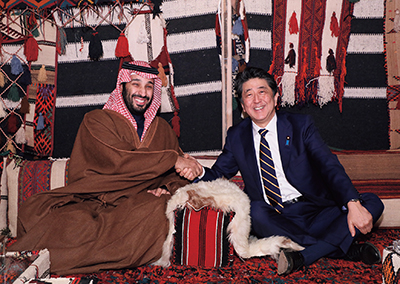Diplomatic Bluebook 2021
Chapter 2
Japan's Foreign Policy by Region
Section 7 The Middle East and North Africa
1 Overview
The Middle East and North Africa (hereinafter, “the Middle East”) is located in a geopolitically important area: the crossroads of Europe, sub-Saharan Africa, Central Asia and South Asia. The region is a vital supplier of energy, representing approximately 50% of the world's oil reserves and 40% of the world's natural gas reserves and also a market with high potential, pursuing the diversification of economy especially in the Gulf countries, against a backdrop of a high population growth rate in recent years.
Meanwhile, the region has gone through various conflicts and disputes along its history, and still faces a number of destabilizing factors and challenges. Regional tension is growing over Iran, and political turmoil continues in various regions since the “Arab Spring” in 2011. Fighting continues in Syria, resulting in a large number of refugees and internally displaced persons, and it has made a great impact on the stability of the entire region, including its neighboring countries. In Yemen, severe security and humanitarian conditions continue as the Houthis clash with the Yemeni Government and the Arab Coalition (led by Saudi Arabia, etc., at the request of the Yemeni Government). The risk of the spread of violent extremism such as the “Islamic State of Iraq and the Levant (ISIL)” also remains in some areas. On the other hand, some changes from the current situation were seen in 2020. In the context of the Middle East Peace, which has been a historical issue since the founding of Israel in 1948, the United Arab Emirates, Bahrain, Sudan and Morocco have agreed to normalize diplomatic relations with Israel. Regarding Afghanistan, the U.S. and the Taliban reached an agreement in February, and the Afghan government has been engaged with the peace negotiation with the Taliban since September.
The Biden administration of the U.S., inaugurated in January 2021, has announced that it will hold talks with Iran to return to the Iran nuclear deal, from which former President Donald Trump had withdrawn. Regarding the Middle East Peace, the Biden administration is also making efforts to improve relations with Palestine, and these policies are worth noting in terms of the impact over the region.
Japan imports approximately 90% of its crude oil from the Middle East, and it is extremely important for Japan's peace and prosperity to promote peace and stability in the Middle East and to maintain and develop good relations with countries in the region. From this point of view, Japan in recent years has been striving to strengthen relations with Middle Eastern countries in a wide range of fields, not just the economy, but also politics, security, culture and people-to-people exchanges, among others. In January, as tensions increased in the Middle East against the backdrop of the conflict between the U.S. and Iran, Prime Minister Abe visited the three countries of Saudi Arabia, the United Arab Emirates and Oman as part of diplomatic efforts to avoid further worsening of situations.
 Prime Minister Abe meeting with Crown Prince Mohammad bin Salman (January 12, Ulah, Saudi Arabia; Photo: Cabinet Public Relations Office)
Prime Minister Abe meeting with Crown Prince Mohammad bin Salman (January 12, Ulah, Saudi Arabia; Photo: Cabinet Public Relations Office)In addition, while diplomatic activities have been restricted due to the spread of the novel coronavirus (COVID-19), Japan is providing assistance to the Middle East with approximately 122 million US dollars in ODA to counter COVID-19. Japan has been introducing such assistance and stressing the importance of addressing the issue based on the concept of human security especially in vulnerable regions, at international conferences by ministers.
